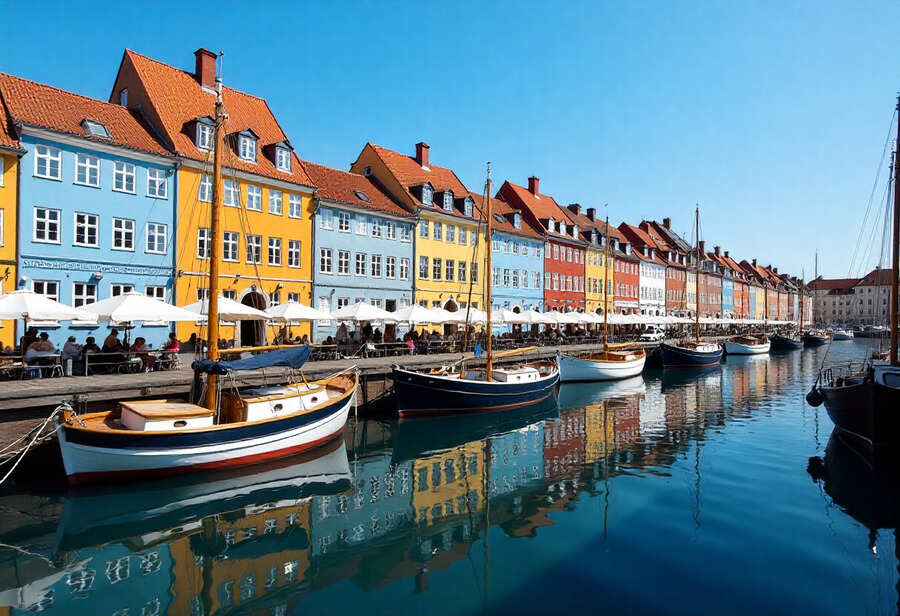ڈنمارک اٹلی ، ہنگری ، یونان ، جمہوریہ چیک ، اسپین ، اور نیدرلینڈ میں یورپ میں ایک اہم سیاحت کی جنگ میں شامل ہوتا ہے۔
ڈنمارک اٹلی ، ہنگری ، یونان ، جمہوریہ چیک ، اسپین ، اور نیدرلینڈ میں یورپ میں ایک اہم سیاحت کی جنگ میں شامل ہوتا ہے۔
ڈنمارک اٹلی ، ہنگری ، یونان ، جمہوریہ چیک ، اسپین ، اور نیدرلینڈ میں شامل ہوتا ہے جس میں یورپ میں ایک اہم سیاحت کی جنگ میں اوورٹورزم سے نمٹنے اور اس پر شائع ہونے والی پائیدار نمو کو یقینی بنانے کے لئے شامل کیا جاتا ہے۔ November 13, 2025Denmark Joins Italy, Hungary, Greece, Czech Republic, Spain, and Netherlands In A Crucial Tourism Battle Across Europe To Tackle Overtourism And Ensure Sustainable Growth as cities across the continent face mounting pressure from the negative effects of mass tourism. Overcrowding, rising housing costs, environmental degradation, and the strain on local infrastructure have forced many European capitals to confront the limits of their tourism capacity. In response, these countries are implementing a range of measures to manage the influx of visitors, aiming to preserve the quality of life for residents and ensure that tourism continues to contribute to sustainable growth without compromising local communities or cultural heritage.Overtourism is a pressing issue faced by many of Europe’s top travel destinations. From the canals of Amsterdam to the ancient streets of Rome, millions flock to these iconic cities each year, driving economic growth but also threatening to disrupt local communities, strain infrastructure, and degrade cultural heritage. In response, countries across Europe, including Denmark, Italy, Hungary, Greece, Czech Republic, Spain, and the Netherlands, are coming together in a battle to manage tourism’s negative impacts, aiming to find a delicate balance between attracting visitors and preserving local ways of life. This article explores the various initiatives and challenges these nations face as they work to combat overtourism and ensure long-term sustainability.AdvertisementThe Growing Crisis of Overtourism Across EuropeEurope has long been a top destination for international travelers, with cities like Barcelona, Venice, Paris, and Amsterdam drawing millions each year. While tourism has undoubtedly boosted the local economies of these cities, the growth has come at a cost. Residents in many areas are now feeling the pressure of overrun streets, inflated housing prices, and reduced quality of life. The rapid increase in short-term rental properties, such as those listed on Airbnb, has contributed to a housing crisis, displacing locals who can no longer afford to live in their own neighborhoods.In response, European governments are adopting a variety of policies aimed at regulating tourism, limiting the number of visitors, and encouraging more responsible travel. The recent rise in tourism taxes, entry fees, and local protests are all part of this larger movement to reduce the environmental and social impact of mass tourism.AdvertisementDenmark’s Progressive Approach to Sustainable TourismDenmark, often regarded as a model of environmental sustainability, is now joining the ranks of countries tackling overtourism. Copenhagen, the nation’s capital, is one of the most visited cities in Scandinavia, attracting millions of tourists annually. However, the city’s relatively small population of around 600,000 residents has felt the strain of mass tourism. Over 12 million international overnight stays were recorded in 2023, and the Danish capital aims to ensure that tourism benefits both visitors and locals.Rather than adopting punitive measures, Copenhagen has taken a more positive approach to encourage sustainable tourism through programs like Copenpay. The scheme, which began as a pilot project in 2024, rewards visitors for engaging in environmentally responsible activities, such as picking up litter, cycling instead of using cars, or volunteering in urban parks. In return, tourists can earn incentives like free ice cream, discounted museum tickets, and other perks. This initiative encourages tourists to behave responsibly, promoting environmental awareness and a cleaner city, while also ensuring that the visitor economy continues to thrive.AdvertisementCopenhagen is also looking at ways to manage the growth of the city’s tourism sector. Officials are considering introducing limits on the number of visitors to certain attractions and monitoring the environmental footprint of tourism activities. This approach aligns with the Danish ethos of sustainability and seeks to preserve the city’s charm while ensuring that the influx of tourists does not compromise the quality of life for its residents.Italy and Spain: Striking a Balance Between Tourism and Local LifeItaly and Spain are two of the most popular tourist destinations in the world, and both countries are grappling with the challenges of overtourism. Cities like Rome, Venice, and Florence in Italy, and Barcelona, Madrid, and Seville in Spain, have seen a sharp increase in the number of visitors, with millions flooding into their historic centers every year.Italy has been particularly proactive in addressing the impact of overtourism. Venice, in particular, has been at the forefront of this battle. The city’s fragile ecosystem and delicate infrastructure make it particularly vulnerable to the impacts of mass tourism. In response, the city introduced a controversial tourism tax in 2025, requiring visitors to pay an entry fee during the high season. The fee varies depending on the time of year, with peak-season visitors paying the highest rates. This measure aims to limit the number of visitors and raise funds to maintain the city’s heritage and infrastructure.Similarly, Barcelona in Spain has become a flashpoint for anti-tourism sentiment. The city has implemented some of the most stringent regulations in Europe to control tourism. The Catalan government has vowed to phase out all short-term rentals, such as those listed on Airbnb, by 2028. Barcelona’s local residents, fed up with overcrowded streets and rising housing costs, have been vocal in their demands for stricter regulations. The city has already taken steps to regulate short-term rentals, with the Urban Planning Commission approving new restrictions aimed at curbing the growth of tourist apartments. Police have also ramped up inspections of illegal tourist apartments, and local authorities are increasing their efforts to enforce the rules.At the same time, Spain has also introduced a tourist tax in some regions, including Catalonia and Balearic Islands, to help fund the preservation of local heritage and infrastructure. These taxes are designed to ensure that the economic benefits of tourism are reinvested into the local community, rather than solely benefiting large corporations or international hotel chains.Hungary, Greece, and the Czech Republic: Unique Challenges and ResponsesIn Hungary, Greece, and the Czech Republic, the challenge of overtourism is also a growing concern. Budapest, the capital of Hungary, has seen a sharp rise in the number of tourists, particularly from neighboring countries. The city’s historic architecture, vibrant nightlife, and thermal baths draw millions of visitors each year. However, Budapest is facing the same challenges as many other European cities: overcrowded streets, a housing crisis, and increased pollution.In response, Budapest has implemented a short-term rental ban in certain districts, with the most heavily affected area being District VI. The ban, which will come into effect in 2026, aims to reduce the impact of short-term rentals on local housing markets and restore balance to the city’s tourism sector. Budapest officials hope that by limiting the number of tourist apartments, they can bring down rental prices and ensure that locals are not pushed out by the influx of visitors.Greece, particularly Athens, is also feeling the effects of overtourism. As the capital city draws more visitors, the government has introduced a series of measures to combat the negative effects of tourism. One of the most significant moves has been a temporary ban on new short-term rental licenses in the heart of Athens. In addition, Greece has implemented a climate resilience tax, which varies depending on the hotel’s star rating. This tax is designed to incentivize tourism during the off-season and promote year-round travel, which can help alleviate the pressures of overcrowding during peak months.In Prague, the Czech capital, tourism has boomed, with nearly 8.1 million visitors in 2024, a 9% increase from the previous year. With a population of just 1.3 million, this influx of visitors has had a significant impact on the city’s infrastructure and housing market. To combat this, Prague has announced plans to limit the availability of short-term tourist accommodations, particularly in the city center. These measures are part of a broader effort to preserve the city’s UNESCO-listed historic center while ensuring that locals are not displaced by tourism-driven gentrification.The Netherlands: Pioneering Anti-Tourism StrategiesThe Netherlands, particularly Amsterdam, has long been a leader in adopting innovative solutions to manage overtourism. The city has implemented more than 75 measures to regulate tourism, ranging from restrictions on short-term rentals to bans on large buses in the city center. Amsterdam also introduced a high tourist tax in 2024, charging visitors €12.50 per night, one of the highest in Europe.One of the most talked-about initiatives in Amsterdam was the launch of the “stay away” campaign aimed at discouraging certain types of tourism, particularly the rowdy, party-focused trips from certain international visitors. The campaign was specifically targeted at male tourists from the UK looking for a “party” experience, and it was designed to redirect them to more appropriate destinations. Additionally, Amsterdam has introduced restrictions on large cruise ships, increasing the tax on day passengers and limiting the number of cruise arrivals in the city.The Road Ahead: A Sustainable Tourism FutureAs Denmark, Italy, Hungary, Greece, Czech Republic, Spain, and the Netherlands continue to battle overtourism, the solution is clear: sustainable tourism is key. These countries are experimenting with a variety of measures to address the negative impacts of mass tourism while still reaping the economic benefits. Whether through taxes, rental regulations, or positive incentive programs, these nations are showing that it is possible to protect local communities and preserve cultural heritage while still welcoming visitors.However, there is no one-size-fits-all solution. Each city must tailor its approach to its own unique challenges, taking into account local needs, economic realities, and the preferences of both residents and visitors. The ultimate goal is to create a tourism model that benefits everyone—tourists, locals, and the environment.As more cities around the world begin to adopt similar measures, the hope is that tourism can continue to be a positive force for economic growth, cultural exchange, and environmental sustainability—without sacrificing the quality of life for residents.Denmark Joins Italy, Hungary, Greece, Czech Republic, Spain, and Netherlands In A Crucial Tourism Battle Across Europe To Tackle Overtourism And Ensure Sustainable Growth, as cities struggle to balance economic benefits from tourism with the rising pressures on housing, infrastructure, and local communities. These nations are adopting various strategies to curb the negative impacts and preserve the cultural and environmental integrity of their most visited destinations.In the end, over-tourism is not an insurmountable challenge. By working together, learning from each other, and adopting innovative solutions, Europe can pave the way for a new era of sustainable tourism, one that respects both the people who live in these cities and the travelers who seek to experience them.AdvertisementTags: denmark, hungary, Italy, sustainable tourism, Travel NewsSubscribe to our NewslettersFollow Travel And Tour World in Google NewsRead Magazine OnlinePARTNERSREGIONAL NEWSEuropeUK Travel Chaos: Three Major Motorways Closed, Disrupting Business and TourismThursday, November 13, 2025Pocket Opera Festival 2025 Unveils Cutting-Edge Musical Creations in SalzburgThursday, November 13, 2025AmericaUS Unites ith Mexico, Brazil, Jamaica, Canada, Bahamas, Dominica and More TwentyThursday, November 13, 2025Philippine Airlines Increases Weekly Flights On Manila To Los Angeles Route FromThursday, November 13, 2025Middle EastSaudi Arabia Joins Bahrain, Jordan, Malaysia, and Algeria As Germany Issues UrgeThursday, November 13, 2025Saudi Arabia and World Economic Forum Launch its Beyond Tourism Initiative, PromThursday, November 13, 2025AsiaThailand Unites With China, Vietnam, Singapore, And Malaysia In The Fiercely ComThursday, November 13, 2025Philippine Airlines Increases Weekly Flights On Manila To Los Angeles Route FromThursday, November 13, 2025MZR Software Inventory ERP – Smart ERP Solutions for Desktop and Web.
Visit: https://mzrsoftware.com






